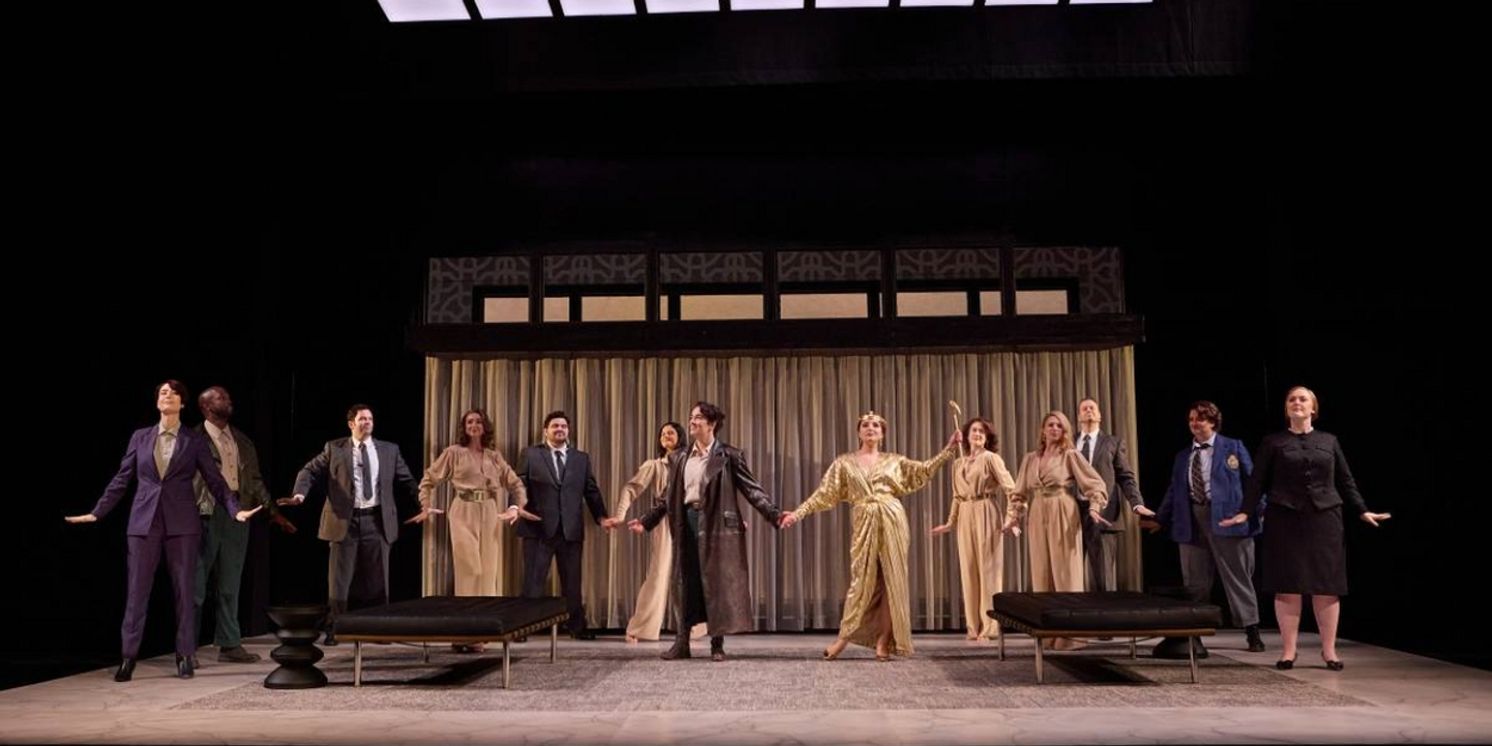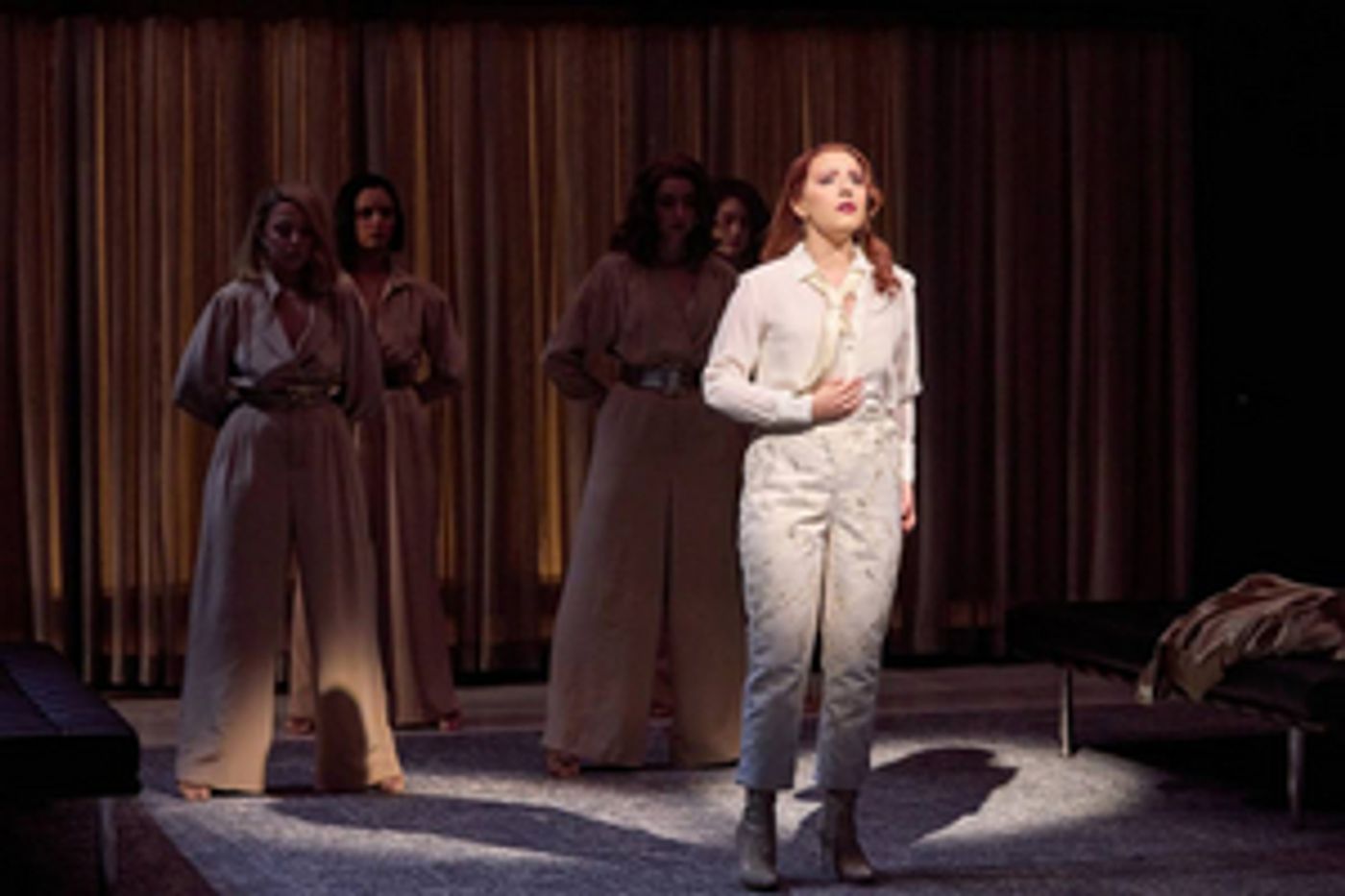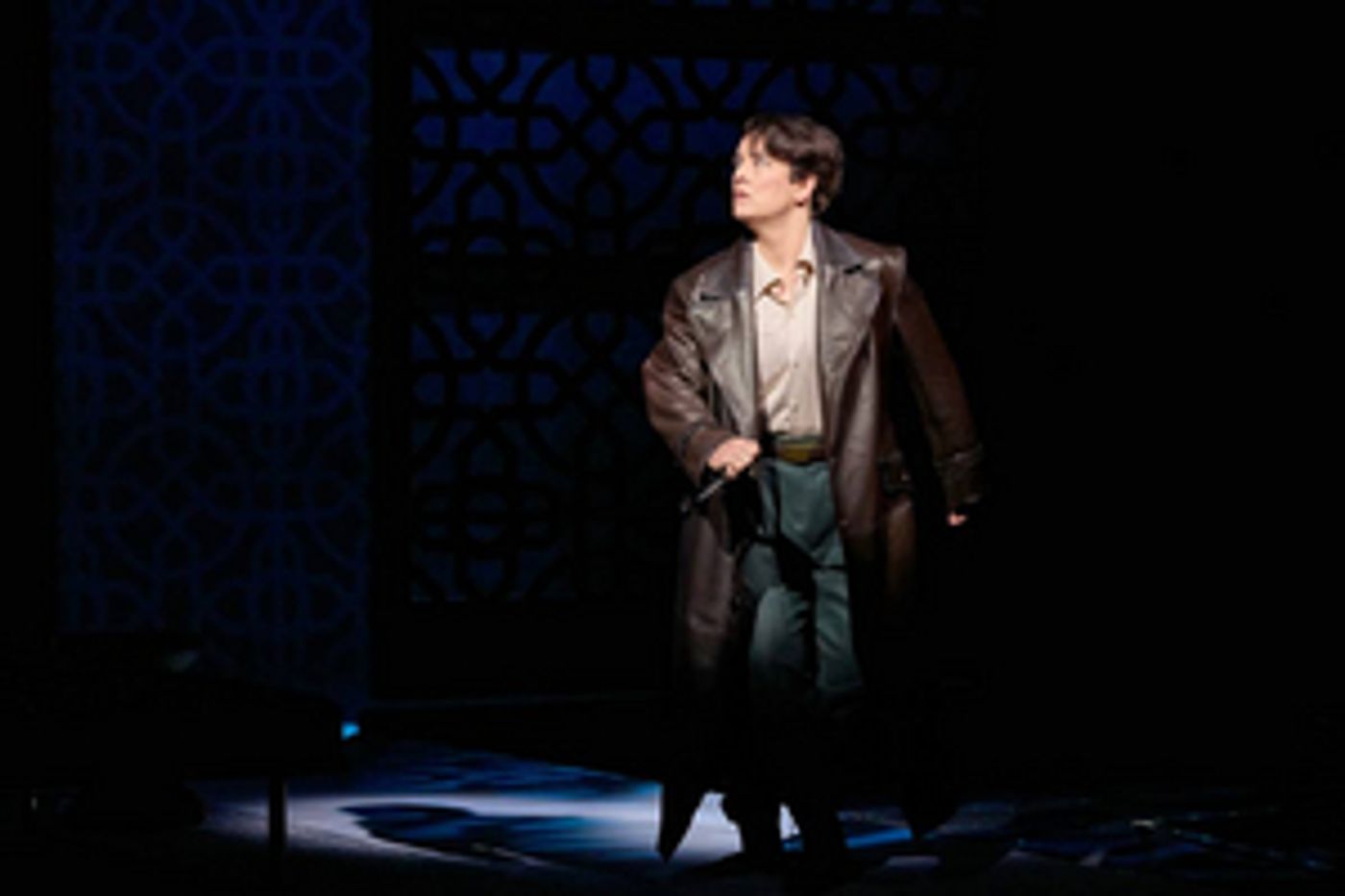Review: JULIUS CAESAR at Opera Theatre Of Saint Louis
Great Jove in his heaven has no melody to match this peerless singing!

Opera Theatre of St. Louis has opened Handel’s Julius Caesar. It’s wonderful.
The sloe-eyed beauty who could charm the conqueror into giving her a kingdom—Cleopatra!
It’s a tale that has long enthralled Western art and literature, involving as it does a powerful and exotic queen in a bellicose time when mighty generals fought for control of the Roman republic.
The history of the Greek dynasty that ruled Egypt for 275 years after Alexander is a bewildering tale of wars and connivery and assassinations and sex, with a great blizzard of pharaohs all named Ptolemy. Most of these Ptolemies married their sisters (who were often named Cleopatra).
But it is Cleopatra VII who has captured our fancy for twenty centuries. The last queen of Egypt! She’s the one who caught Caesar’s eye. And Antony’s. And Handel’s. She was co-pharaoh with her brother when Caesar invaded Egypt in his war against Pompey.
Cleopatra was smart, and beautiful, and very very ambitious. She strove to unseat her kid brother (Ptolemy XIII) from his side of the throne so she could rule Egypt alone. What better tactic than to make friends with the powerful Caesar?
In Handel’s version it becomes TRUE LOVE.
OTSL has a good record with Handel. Nine years ago they did his Ricardo Primo (as Richard the Lionheart); it was, perhaps, the finest live performance of an opera that I’ve ever attended. With Julius Caesar they have again assembled some quite astonishing voices. This opera debuted almost exactly 300 years ago. In the fashion of the time many leading men’s roles were written for castrati. Such singers had the vocal range of a woman, but the lungs and chest of a man. Thus they could sing those high notes with unbelievable power and stamina. Nowadays, alas, it’s rather hard to find castrati, so the roles are given to countertenors or, frequently, to women playing men (i.e. “breeches roles” or “travesti”).
Those protagonist roles are intensely challenging, filled with difficult baroque decorations, exhibitionary ranges, dramatic dynamics—and little occasion to rest. But Sarah Mesko strides into the role of Julius Caesar and triumphs in it. Such believably manly grace and confidence she brings to it—both musically and as an actor. Slim and oh-so-handsome in that black trench-coat. So physically articulate and sure! Such mastery of vocal dynamics—that glorious crescendo, that breathtakingly controlled long diminuendo! Such lucid diction, such sweet purity of tone across her vast range! I am once again convinced that masculine ardor and force can be embodied simply in the mastery of beauty, whatever the vocal range. Keep this woman!
Emily Pogorelc sings a stunning Cleopatra. She bears the heaviest load in this work: eight arias and three trios (compared with Caesar’s seven and two). And she does so with perfect ease! Her voice dances! After vocally climbing to the loftiest perch imaginable she can, with a bright tracery of baroque flourishes, swiftly vault up yet another octave. WOW!!
Cornelia, Pompey’s widow, is sung by mezzo-soprano Meridian Prall. She’s an outstanding alumna of OTSL’s Gerdine Young Artists program, and she’s climbing the steps on that career ladder: 2021—Center Stage, 2022—Gerdine Young Artist (Magic Flute), and now she’s an Endowed Artist. Her Cornelia displays Ms. Prall’s rich, fluid voice. It’s a voice capable of great emotion, as is required for this woman; she’s filled with bitter grief for her murdered husband and she’s held captive as two hated lustful men fight to own her. But her voice also bears a deep sweetness, especially when blending with the gorgeous low strings of the orchestra. And impressive diction: her final “T”s are like sparks struck from flint.
Key’mon W. Murrah brings a most marvelous countertenor to the role of Ptolemy, the co-pharaoh. (He, too is a Gerdine Young Artists alum.) He can sing an aria, seeming to end on a high note; then, like a lark rising, his voice soars to the sopranic stratosphere—all with a smooth purity of tone.
Megan Moore, who sang a lovely Dorabella in last year’s Così fan tutte, sings Sextus, Cornelia’s young son. Sextus is bursting with a passion to wreak vengeance on Ptolemy for the murder of his father. Ms. Moore does beautiful, lyrical work in this role.
All these high voices are very fine, but the voices of bass-baritone Cory McGee and bass John Godhard Mburu are a delicious welcome contrast. McGee sings Achillas, the Egyptian general, with great strength and clarity. Mburu sings Curio, a Roman Tribune and aide to Caesar. His rich bass fills Curio with the clarity of a great bell.
Cleopatra’s confidante Nirena is sung by Madeleine Lyon (a Gerdine Young Artist). She’s a striking visual presence on the stage—slim, black-clad, and (already taller than most of the cast) she towers on three-inch stiletto heels. But the visuals pale in comparison with the splendid audio—her glorious voice.
Allen Moyer designed the striking, sleek set. Costumer Constance Hoffman gives the ladies some very glamorous togs (though poor Sextus, with pants too short and a rumpled school blazer looks just disheveled).
Eric Southern designed the lighting, which deftly follows and supports the various scenes. Crisp follow-spotlights are particularly dramatic in two arias, both on a dark stage: first by Cleopatra, dressed in pure dazzling white, then by Caesar clad in inky black.


The orchestra is composed of musicians from the St. Louis Symphony Orchestra. Daniela Candillari, OTSL’s Principal Conductor, leads them from the harpsichord keyboard. Flawless!
So, musically the show is right up there with the best of OTSL’s work.
Now about the concept:
When a producer and director set out to change the time or setting of a work they should be required to sign a sort of Hippocratic oath: “Firstly, do no harm!” Let’s look at OTSL’s three productions of early operas.
- Richard the Lionheart. Hero king rescues his love from the clutches of a villain.
This is a classic opera plot: romantic melodrama. The set and costumes simply and beautifully supported this story and mood. - The Coronation of Poppea. Gold-digger will do anything to become Nero’s empress. The libretto is full of beautiful romantic music about their true love. (Huh?) Well the original audience was more than aware of the dark irony that this story carried. But OTSL’s modern production had to augment this irony—which is tacit in the libretto. Thus transposition to a sleek fascist world, with a weirdly threatening set—and some blood. No harm, just support.
- Julius Caesar. How did Stage Director Elkhanah Pulitzer and her designers: address this opera? (Let me just step out of this list format to get some elbow room.)
The set (by Allen Moyer) is a sleek and spare ultramodern … hotel? … office building? Great doors and wall of glass, a hallway beyond, another wall of glass behind. A track curtain is occasionally drawn across the back. Caesar in a dark suit and a long sexy trench-coat, Ptolemy in a smoking-jacket, black shoes, no socks. A couple of modern military uniforms, and a lot of guys in identical dark suits and ties.
Cleopatra and her women wear the glitziest of things—sort of “glamour-slack harem-pant jump-suits”. In the earlier scenes they dance happily, sexily and well—but it’s too “pop”, too commercial for this tale.
Is this maybe Vegas? This could be setting us up for a power struggle between contending mobs. (Not a bad analogy.)
But the movement! Time and again the blocking is arbitrary—or awkward. People move about the stage randomly. Guards meaninglessly turn Cornelia and Sextus around three times as they lead them off to prison. People are constantly circling each other. Cornelia and Sextus engage in a bizarre synchronized abstract arm-and-hand business. It sometimes gets ludicrous, as when all those dark suits get to chasing each other around the room and halls in a sort of iconic squat-trot with handguns held rigidly at the fore. Of all the people on stage only Sarah Mesko consistently uses the space naturally and dramatically. She grips us.
Now there is one big production number wher e Cleo and the Cle-ettes entertain Caesar. It’s fabulously glitzy! Against a great golden sunburst Cleo (with a Statue-of-Liberty crown) sings as her girls waft great golden fans around. It’s Ziegfeld! It’s Busby Berkeley! It’s a court masque from the 17th century! Everybody dances! Choreographer Seán Curran makes it all very exciting, but its raucous modern style robs it of all but the cheapest form of glamour. Even Ptolemy at one time gets to swing and bump in some sort of boog-a-loo.
e Cleo and the Cle-ettes entertain Caesar. It’s fabulously glitzy! Against a great golden sunburst Cleo (with a Statue-of-Liberty crown) sings as her girls waft great golden fans around. It’s Ziegfeld! It’s Busby Berkeley! It’s a court masque from the 17th century! Everybody dances! Choreographer Seán Curran makes it all very exciting, but its raucous modern style robs it of all but the cheapest form of glamour. Even Ptolemy at one time gets to swing and bump in some sort of boog-a-loo.
Sextus is a youth so filled with the fire of family honor and pride that he can’t wait to sink a vengeful sword into Ptolemy. Why, in this production, is he portrayed as a sullen, coke-snorting teen-ager?
And throughout the show hotel maids, in standard neat uniforms, appear in the hall. One has a janitor’s cleaning cart. They occasionally notice the folks doing all that drama stuff in the main room. Then they casually move on.
This opera shows two people who are, through natural chemistry, drawn into each other's’ arms. That happens a million times every day. But in Handel’s opera the people are great historic figures, filled with grandeur and romance: the master of the Roman republic and the great queen of an exotic land. In this OTSL rendition the grandeur and romance and exoticism are tossed away. The story here might be about Harry & Sally, or Bugsy & Roxie—but it is not about Caesar and Cleopatra.
All in all I think Ms. Pulitzer has betrayed her “Hippocratic oath”. Her treatment has harmed Handel’s tale.
But musically the show is magnificent. Julius Caesar plays at Opera Theatre of St. Louis through June 28.
(Photos by Eric Woolsey)
Reader Reviews

Videos

